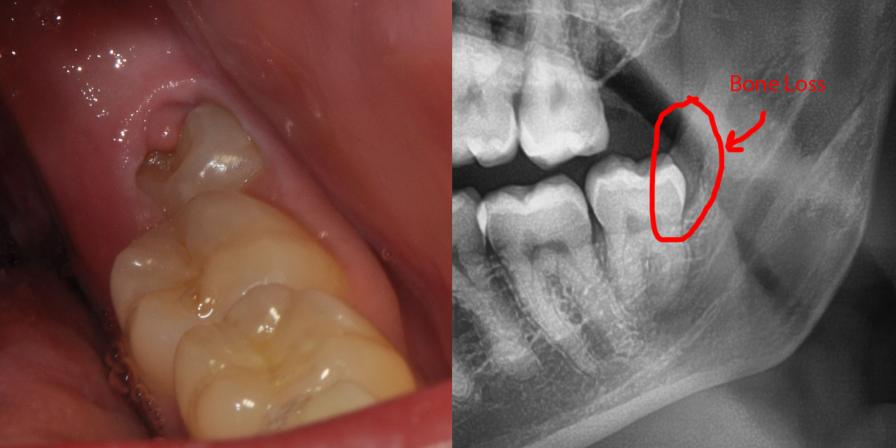Impacted wisdom teeth removal is a common surgical procedure carried out at Shangrila Dental Clinic, Kathmandu Nepal. For an appointment call (977)-9841815537.
What are wisdom teeth?
The third or last molars in the back corner of your upper and lower jaw are known as wisdom teeth. These are the last teeth to erupt and got their name because it is believed that by the time these teeth emerge, you have gained some “wisdom”. A wisdom tooth makes its appearance – somewhere between the ages of 17 and 25. However, Some people never develop wisdom teeth. For others, wisdom teeth erupt normally — just as their other molars did — and cause no problems.
What has impacted Wisdom teeth?
As previously mentioned, a wisdom tooth erupts anywhere between the age of 17-25. However, when the jaw is small or if there isn’t much room left in the mouth for it to erupt, it gets locked. This is known as impacted wisdom tooth.
Impacted teeth may grow sideways, emerge only part way from the gum or remain trapped entirely beneath the gum and jawbone.
Problems with impacted wisdom teeth include
- Pain
- Trapping of food and debris behind the wisdom tooth
- Infection or gum disease (periodontal disease)
- Tooth decay in a partially erupted wisdom tooth
- Damage to a nearby tooth or surrounding bone
- Development of a fluid-filled sac (cyst) around the wisdom tooth.

When to remove the wisdom tooth?
If you are over 25 years of age and the wisdom tooth is causing pain, infection-you should see the dentist.
However, if you are under 25 years of age and your wisdom tooth is causing the problem but there appears to be enough room for them to grow straight, without crowding other teeth, a wisdom teeth extraction may not be necessary. However, every case is unique so better to consult your dentist.
Wisdom teeth removal procedure.
Wisdom teeth removal is one of the most common dental surgery procedures. At Shangrila Dental Clinic, an impacted wisdom tooth is removed by an Oral and maxillofacial Surgeon. You will be required to get a Panoramic X-ray. Wisdom teeth extraction is an outpatient surgery, which means you arrive and leave the clinic on the same day. The extraction is done under local anesthesia. You will be awake during the tooth extraction. Although you’ll feel some pressure and movement, you will not experience pain. After the extraction, stitches are placed which need to be removed after 1 week.
How long does it take to recover from wisdom teeth removal surgery?
Some pain and swelling are normal. You can start using an ice pack on your face as soon as you’d like. You’ll also be given instructions on when and how to take medications. You can eat very soft foods after surgery but avoid alcohol, caffeine, and smoking. You should also avoid using a straw. This can lead to complications.
Recovery from wisdom teeth surgery takes about three days but can take up to a week or more. It’s important that you follow the at-home care instructions that your dentist gives you in order to aid healing and prevent infection.
The wound left behind after surgery won’t be completely healed for months, so you can still develop an infection weeks after surgery if you don’t take care.
You can resume normal, daily activities the day after surgery, but avoid any activity that could dislodge stitches or the blood clot over your wound. This includes, but isn’t limited to:
- strenuous exercise
- smoking
- spitting
- drinking from a straw
Home care after wisdom teeth removal.
It’s very important that you do a good job of caring for your mouth when you get home to avoid infections and complications. Your dentist will give you exact instructions on how to clean and protect your mouth after surgery. This might be the only time your dentist tells you not to brush, rinse, or floss for a whole day.
Common cleaning instructions include:
- Rinsing with salt water to keep the wound clean. Don’t spit the water out when you rinse. Instead, tip your mouth over the sink and let the waterfall out.
- Gently dab the wound with gauze to absorb excess blood.
You should be able to go back to daily life a day or two after surgery. You’ll want to be very careful not to dislodge your blood clot or stitches for a week. Like any scab, the blood over your wisdom tooth hole protects and heals the wound. If the blot clot is disrupted, you’ll be in increased pain and at an increased risk of infection. When this happens, it’s called a dry socket.
Food to eat and Food to avoid
Choose food that will be easy to eat without much chewing, and that won’t disrupt your blood clot or stitches.
When eating, avoid:
- extremely hot food that can burn the site of the surgery
- nuts or seeds that could get stuck in the hole where your wisdom teeth used to be
- drinking from a straw, or slurping too vigorously from a spoon, which can dislodge your blood clot or ruin stitches
When to call your dentist
Some swelling, pain, and bleeding are normal after wisdom teeth removal. Call your dentist immediately if the pain or bleeding is excessive and unbearable.
Seek help if you experience any of these symptoms:
- trouble swallowing or breathing
- fever
- medication not effective at dulling the pain
- swelling that gets worse over time
- numbness
- blood or pus coming out of your nose
- bleeding that doesn’t stop when you hold gauze to it and apply pressure
